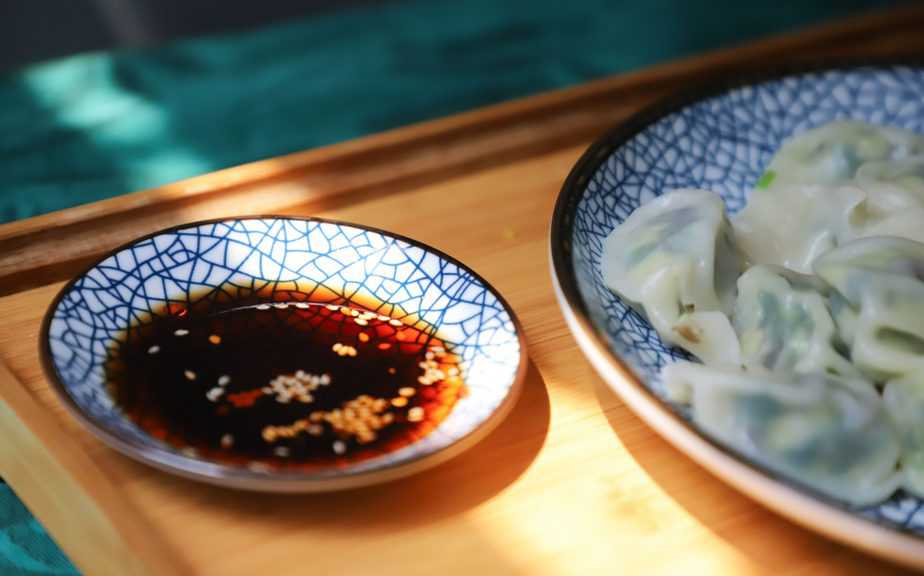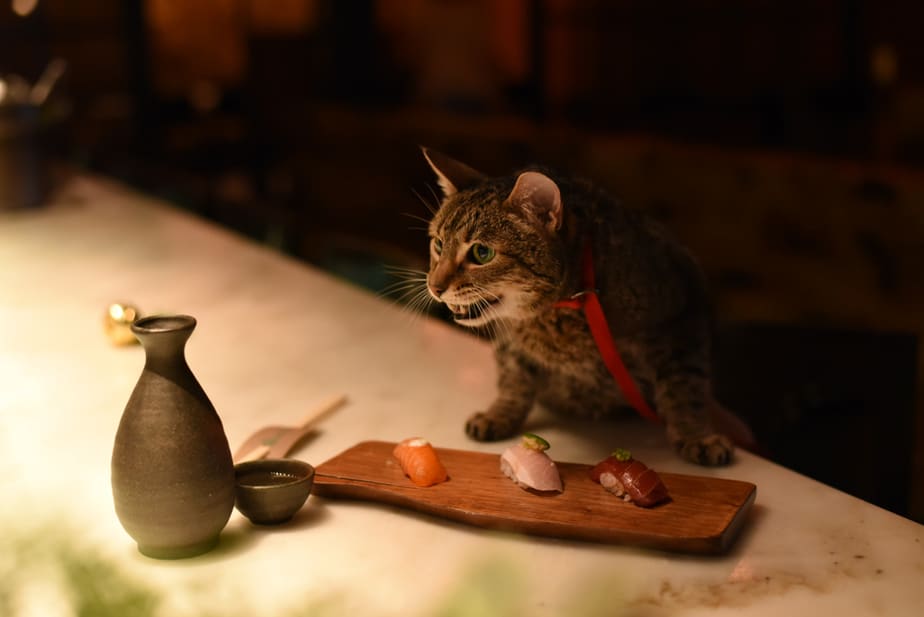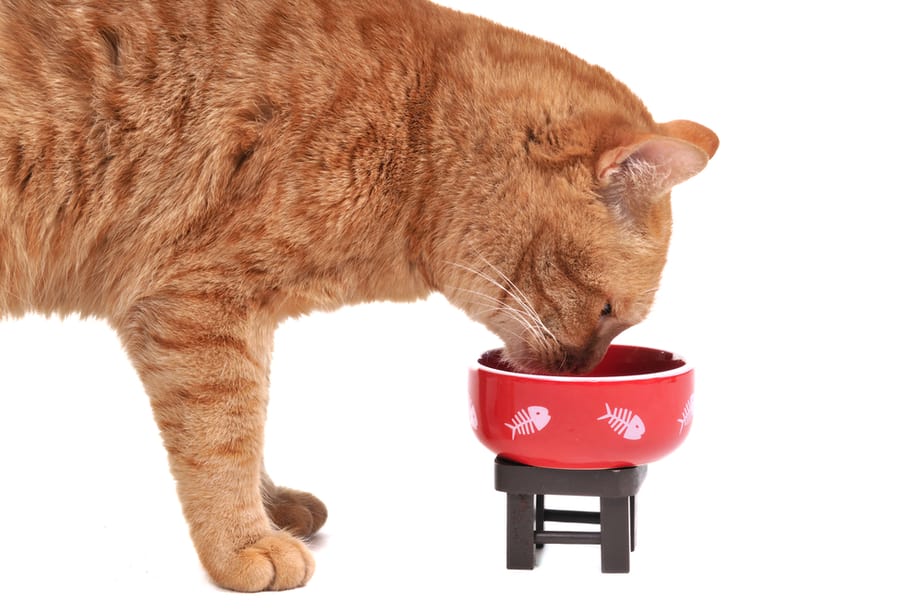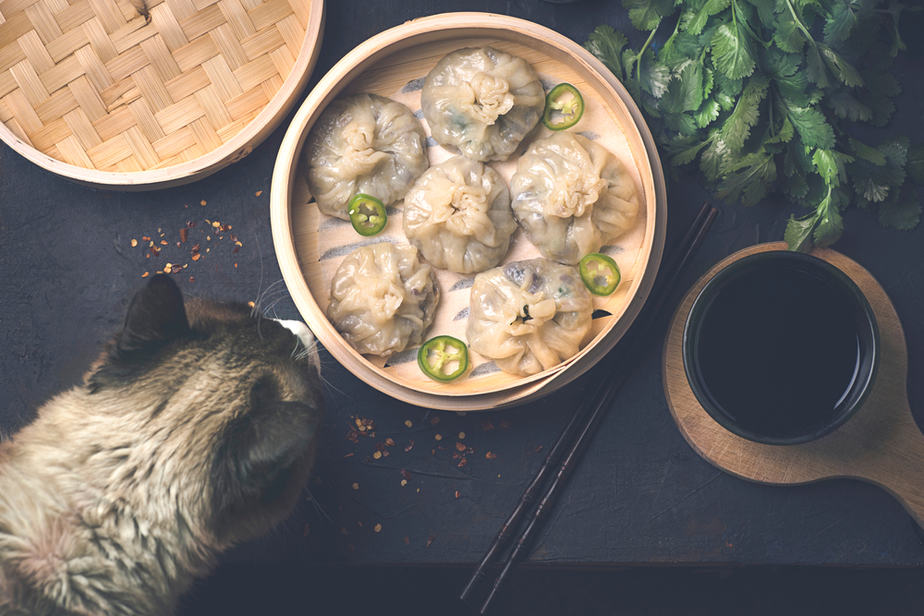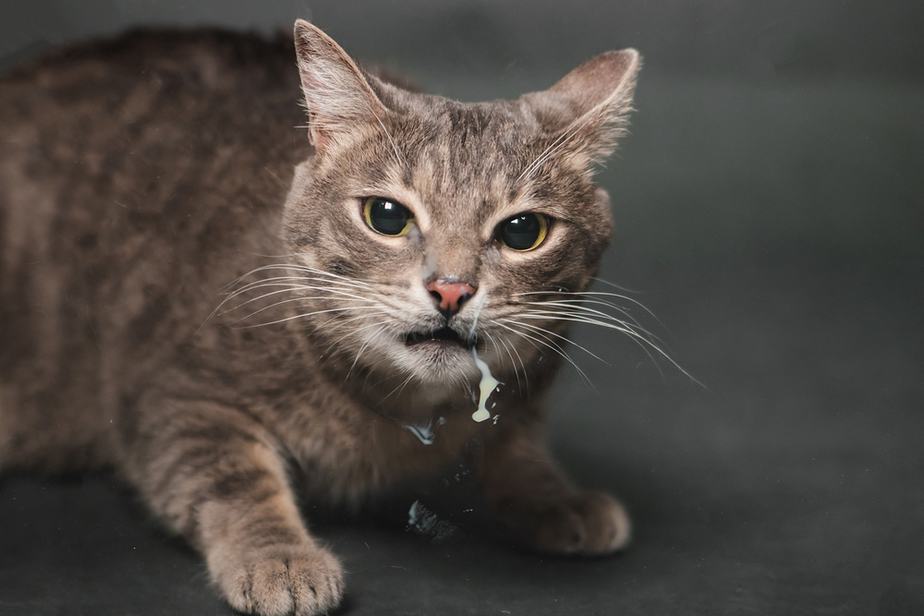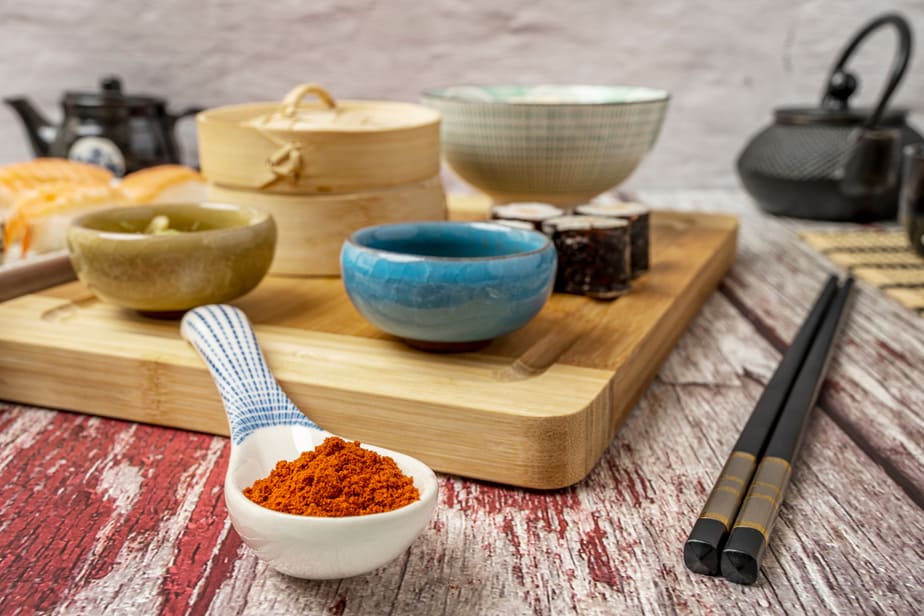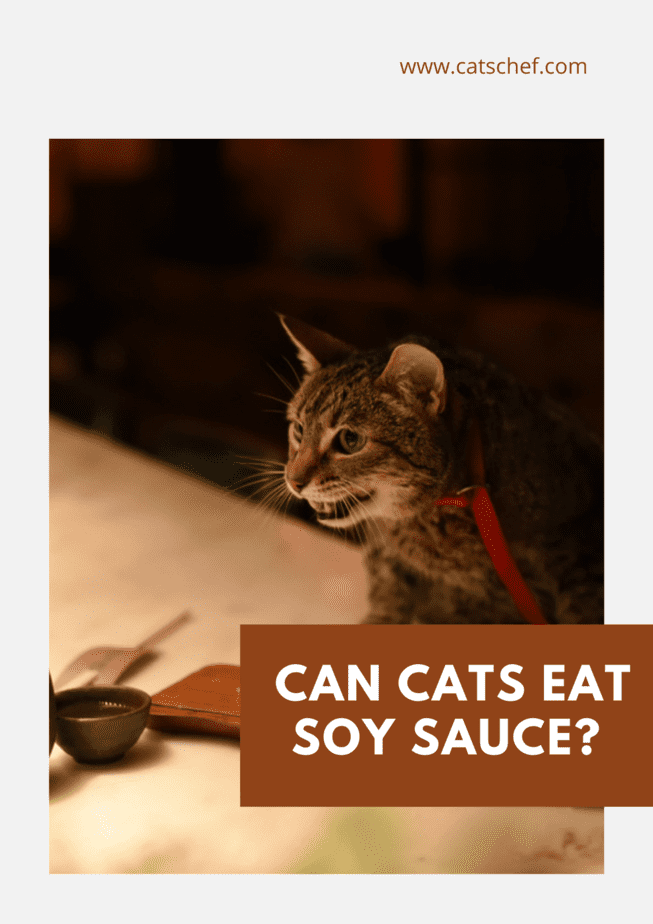📖 Table of Content:
Sauces have become humans’ regular step in food preparation. We love spices and sauces because they make our food flavor-dense and our mouth water. People often opt for savory ones, such as soy sauce. But what about cats, can they eat soy sauce?
Cats are simple creatures, even if it sometimes doesn’t seem so. If you marinated something and left it soaking for a minute or two, you probably returned to a crime scene.
You catch the thief because of the visible pawprints and traces of soy sauce on her whiskers. You feel your face getting red, but an overpowering feel of concern overtakes you.
If she ate some soy sauce, is it cause for panic? Your marinade now has a flavor of your pet’s toe beans and she’s earned herself stained paws. Are you in for something worse?
What is soy sauce? And can cats eat it?
We’re just going to break it down for you and say no. Cats can’t eat soy sauce, and here’s why.
First of all, soy sauce doesn’t hold any nutritional value to felines. Cats are in need of animal protein, which soy sauce has none of. Soy sauce is comprised of wheat, soybeans, salt, fermented agents, and water.
So, no nutritional benefits are reason enough to keep your cat away from this sauce. If you still need some convincing, we’re going to provide you with some.
Second of all, some of the ingredients in soy sauce might be poisonous to your feline.
Is soy sauce dangerous to cats? Can they eat it?
Technically, soy sauce isn’t toxic to felines. However, you should avoid offering her some because of its ingredients. As previously mentioned, soy sauce is made of wheat, soybeans, water, and salt. Let’s see which of these is the intruder.
1. Water
Water is the healthiest drink of all time. Daily water intake is required so your kitten stays healthy and hydrated. So, water is definitely not the problem here.
Felines get most of their water from eating foods, such as wet cat food. Unfortunately, soy sauce isn’t recommended for cats. She wouldn’t get the needed amount either way.
2. Soybeans
Soybeans or soya beans find their place in various types of foods. They are rich in vegetable protein. If you haven’t noticed what’s wrong with that, here’s a brief explanation.
Although rich in protein, which can possibly benefit your fluff, soybeans consist mainly of plant protein. Your carnivorous furbaby isn’t wired to digest these easily, so it could be a bit of a problem.
So, while soybeans on their own aren’t dangerous to your cat, they won’t benefit her much. If you want to add some protein to your kitty’s food, try animal-derived gelatin.
3. Wheat
This ingredient doesn’t pose a threat to your cat’s health. But, while it isn’t harmful, it can’t bring much good either. Wheat and other grain-based foods are often a part of commercial cats’ foods.
The reason for this is that wheat serves as a filler. It’s not toxic to cats, therefore it has its place in cat food. Your fluff probably won’t bat an eye for grain-based foods if ever offered, though.
Although wheat contains some vitamins and minerals beneficial to felines’ bodies, they’re just unable to break it down. Plant-based material is made for omnivores and herbivores, not carnivores.
4. Fermenting agents
Soy sauce is an oriental condiment that’s produced by the process of fermentation. The fermentation process results in very low energy quantities.
Besides that, fermenting agents can be detrimental to your pet’s health. Some consequences might involve nausea, respiratory problems, and in severe cases – seizures.
5. Salt
Sodium is one of cats’ enemies. Sodium is an essential mineral that we all need, including felines. How is it possible that cats need sodium while it’s toxic at the same time?
Cat food has a certain amount of salt that isn’t harmful to your feline. This is because the salt content in cat food is balanced with other ingredients.
Other nutrients such as fiber, vitamins, minerals, and carbs find their way into your pet’s food and regulate the amount of salt. However, cat food is different from humans’.
The difference is cats need salt as a mineral, while humans use it as a table condiment. Salt is often inevitable while cooking anything. Especially in soy sauce, where we find great amounts of it.
Sodium poisoning in cats
Although it’s an important mineral for your furball, salt can be toxic for cats. One tablespoon of salt is all that’s needed to cause salt poisoning.
Given that soy sauce has excessive amounts of salt, you should keep it out of your feline’s reach. While a lick or two is probably no big deal, continued intake can result in a different, unwanted outcome.
If your cat has decided to sample some soy sauce, a few symptoms can occur if she’s consumed enough. Common signs of salt poisoning include vomiting, diarrhea, as well as excessive thirst and urination. Other clinical signs to watch out for are inappetence and lethargy.
Consuming salt puts your feline’s health at high risk. Some severe cases might include tremors, seizures, and even coma. Other health issues aren’t excluded, such as kidney problems.
This being said, make sure your cat doesn’t eat soy sauce because it can lead to a number of complications.
Soy sauce allergy in cats
This popular Chinese sauce can cause allergic reactions in humans, as well as cats. Soy sauce allergy is one more reason to not feed it to your cat.
You never know if your feline is prone to allergies until it happens. Soy sauce is among the most common foods that cause allergies. Other foods that can initiate allergies are chicken, wheat, fish, and corn.
Felines can be allergic to soy sauce from birth or develop it as they get older. Another possibility with soy sauce allergy is that your pet might outgrow it past the kitten stage.
Not every cat is this lucky because some of them carry this allergy into adulthood. Symptoms of an allergic reaction include stomach sensitivity and itching of the skin.
In rare cases, it can lead to anaphylaxis, which can be life-threatening.
Can cats eat soybeans or soya sauce with other foods?
Soy sauce can be found in baked goods, cereals, and even canned tuna and meat. Given that cats just love tuna and meat, watch out for any soy sauce.
Regular intake of soy sauce from these products can negatively affect your cat’s health. Even if its content in these foods is low. Another poor decision could be soy ice cream.
You might believe it’s better for felines instead of a regular ice cream made with milk. This isn’t true because both milk and soybeans don’t hold any beneficial supplements for felines.
Can cats drink soy milk? Treat or threat?
Soy milk isn’t necessarily harmful to your kitten. Yet, it isn’t really beneficial. Soy milk is an emulsion of water, protein, and oil. It doesn’t contain cow’s milk, which definitely goes in favor of your cat.
Most felines are lactose intolerant and soy milk could be an alternative for both humans and cats who cannot consume lactose. This plant-based drink is among the top choices for vegans.
Alongside having no nutritional value to felines, soya milk contains sugars that cannot be easily digested by cats. Troubles with digesting these sugars can lead to flatulence and other digestive problems.
Can cats drink almond milk?
Just like soy milk, almond milk doesn’t contain any dairy products. This is good news for your lactose intolerant fluffball. Almond milk is made from, as you guessed it, processed almonds.
Even though this option seems safe, almonds are high in oils and fats. This can cause some problems for your companion’s digestive system. The reason both soy and almond milk aren’t recommended is that they are calorie-dense.
These extra calories can lead to your pet becoming overweight, which in turn may cause some additional medical problems.
Also, soy and almond milk often include artificial sweeteners. These can in no way benefit your feline. In fact, one of the most common sweeteners, xylitol, is toxic to felines.
Is Tamari sauce safe for cats?
While it may appear Tamari and soy sauce are the same, you’re wrong. Although similar, these two differ. Tamari sauce is richer in flavor and darker in color.
Soya sauce contains higher levels of salt than Tamari. This is great news for your kitten because an excess amount of salt eventually leads to medical problems.
Another key difference between these two sauces is their wheat content. Soy sauce is made of wheat while Tamari is made with little to no wheat. Because of this, Tamari is somewhat safer for your furkid.
Yet, this doesn’t mean it should be an option to include in your cat’s regular diet.
Related post: Can Cats Eat Sushi? Feline Delicacy Or Danger?
Read more: Can Cats Eat Pesto? Is This Herby Sauce Safe For Cats?
Bottom line
Humans can eat soy sauce as it comes with health benefits, but the same can’t be said for cats. While soy sauce is used in many foods, it should stay off of your kitten’s plate.
A lick every now and then from your bowl, there’s no reason to worry. That is unless your cat is prone to allergies. Soy sauce allergy is common in cats, so be careful what your fluff consumes.
Soy sauce in large quantities can be dangerous because of its high sodium content. This can lead to sodium toxicity, which can cause some severe medical conditions.
This condiment is used in a variety of foods, so it’s best to be extra attentive, especially when you’re having Chinese takeout. Cats can eat soy sauce, but we can’t guarantee it will be without consequences!
Read more: Can Cats Eat Ketchup? Everything A Responsible Cat Owner Should Know
